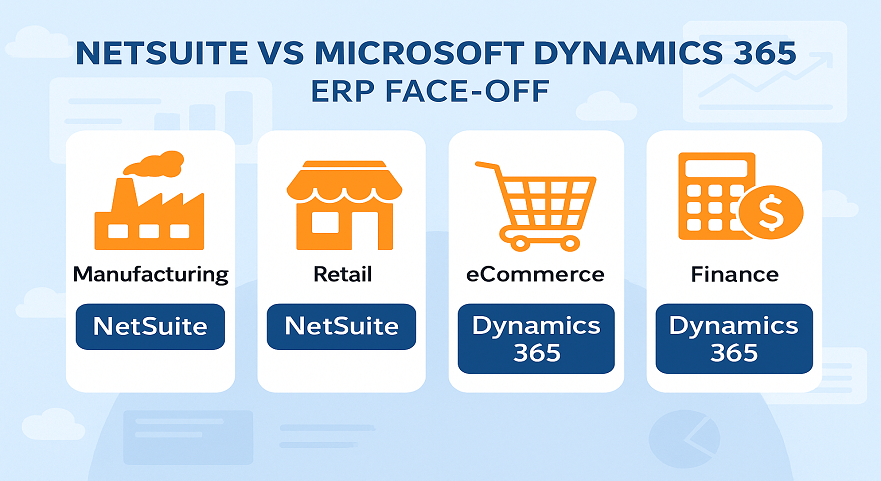NetSuite vs Microsoft Dynamics 365: ERP Face-Off

In this NetSuite vs Microsoft Dynamics 365: ERP Face-Off, we will break down the key differences between these two leading ERP platforms. From functionality and deployment to pricing and scalability, this detailed comparison will help you decide which ERP solution aligns better with your business needs.
Feature Comparison: Functional Strengths of Each Platform
Core ERP Modules
- NetSuite offers a cloud-native suite with finance, CRM, eCommerce, and inventory.
- Microsoft Dynamics 365 separates its ERP and CRM functions into apps like Finance, Supply Chain Management, and Sales.
Customization & Integration
- NetSuite provides strong customization through SuiteCloud.
- Dynamics 365 integrates seamlessly with Microsoft tools like Office 365 and Power BI.
Deployment & Scalability
- NetSuite vs Microsoft Dynamics 365: ERP Face-Off becomes more interesting when considering deployment.
- NetSuite is cloud-first with multi-subsidiary and multi-currency support, ideal for global companies.
- Dynamics 365 offers on-premises, cloud, and hybrid deployment—flexible for businesses still transitioning to the cloud.
User Interface & Experience
- NetSuite has a unified dashboard with real-time KPIs.
- Dynamics 365 has a modern UI, especially familiar to those using other Microsoft products.
Pricing Structure
- In the NetSuite vs Microsoft Dynamics 365: ERP Face-Off, pricing is a critical factor.
- NetSuite offers role-based pricing but requires a minimum annual contract.
- Dynamics 365 uses a modular pricing model—pay only for the apps you need.
Support and Partner Ecosystem
- NetSuite has Oracle’s backing and a strong global partner network.
- Microsoft Dynamics 365 benefits from Microsoft’s extensive ecosystem and certified Gold partners.
Security & Compliance
- Both platforms meet global standards like GDPR, SOC, and ISO.
- NetSuite emphasizes secure financial compliance.
- Dynamics 365 provides enterprise-grade security via Microsoft Azure.
Key Differences at a Glance
NetSuite vs Microsoft Dynamics 365: ERP Face-Off simplifies when you see:
- Deployment: NetSuite = Cloud only | Dynamics 365 = Cloud, On-premises
- Modularity: NetSuite = Unified | Dynamics 365 = App-based
- Best for: NetSuite = Mid to large global enterprises | Dynamics 365 = Businesses needing MS integrations
Pros & Cons Table
| Feature | NetSuite | Microsoft Dynamics 365 |
|---|---|---|
| Deployment | Cloud Only | Cloud / On-Prem |
| Integration | SuiteApps | Microsoft Ecosystem |
| UI/UX | Functional | Modern & Familiar |
| Pricing | All-in-one | Modular (per app) |
| Best For | Global Expansion | Microsoft Users |
- NetSuite is ideal for rapid global scaling.
- Microsoft Dynamics 365 is better suited for businesses using Office 365 suite.
- NetSuite offers built-in financial compliance tools.
- Dynamics 365 offers AI-based insights through Microsoft’s ecosystem.
Conclusion
Choosing the right ERP depends on your company’s size, IT infrastructure, and long-term strategy. This NetSuite vs Microsoft Dynamics 365: ERP Face-Off helps you evaluate both solutions side by side. Whether you’re a growing eCommerce company or a manufacturing giant, your ERP should evolve with you.
Which ERP is the right fit for your business? Talk to our ERP experts today and make the most informed decision from this NetSuite vs Microsoft Dynamics 365: ERP Face-Off.
📞 Tech i-Vin Technology – Your trusted advisor for NetSuite and Dynamics 365 implementation.
Contact us now and start your digital transformation journey!
